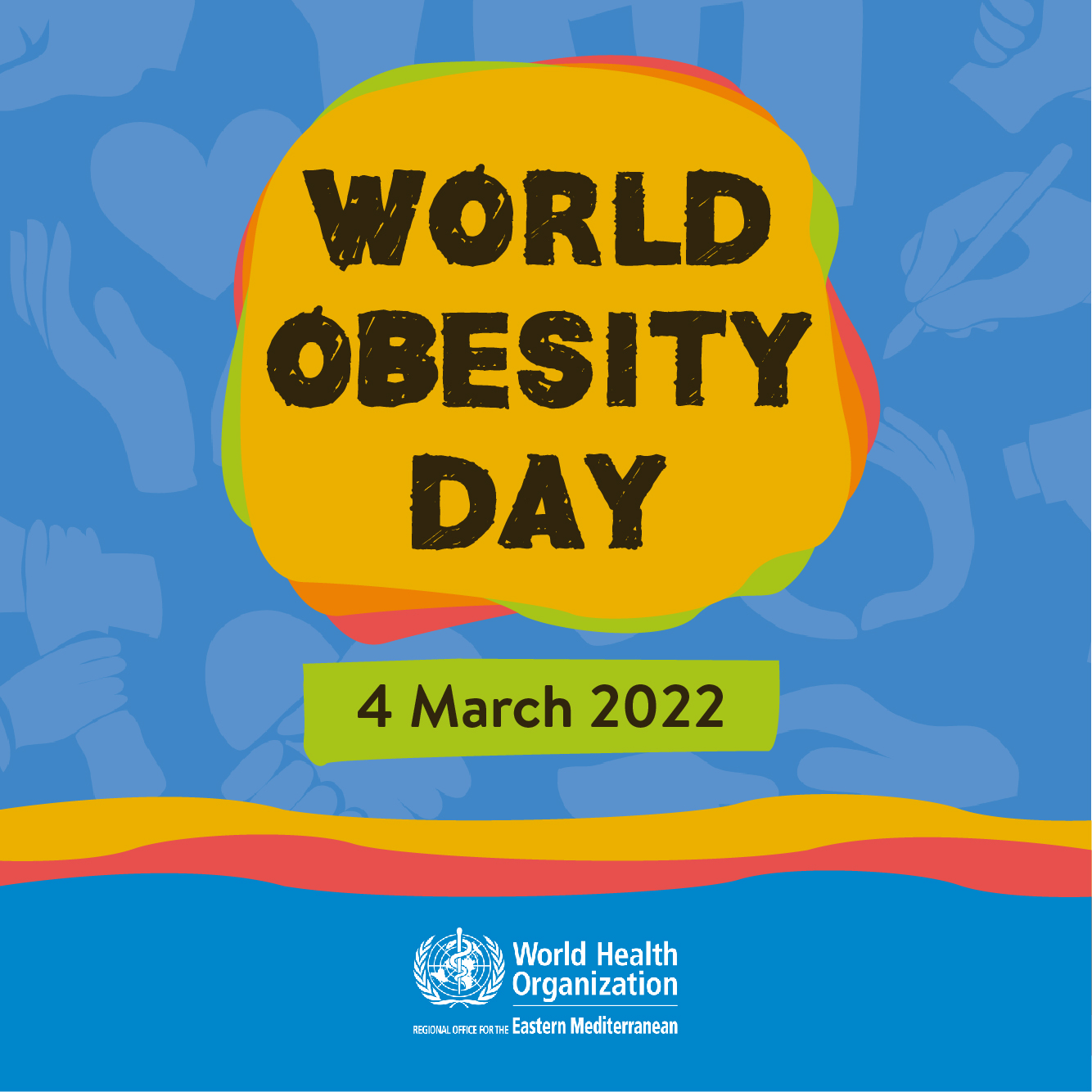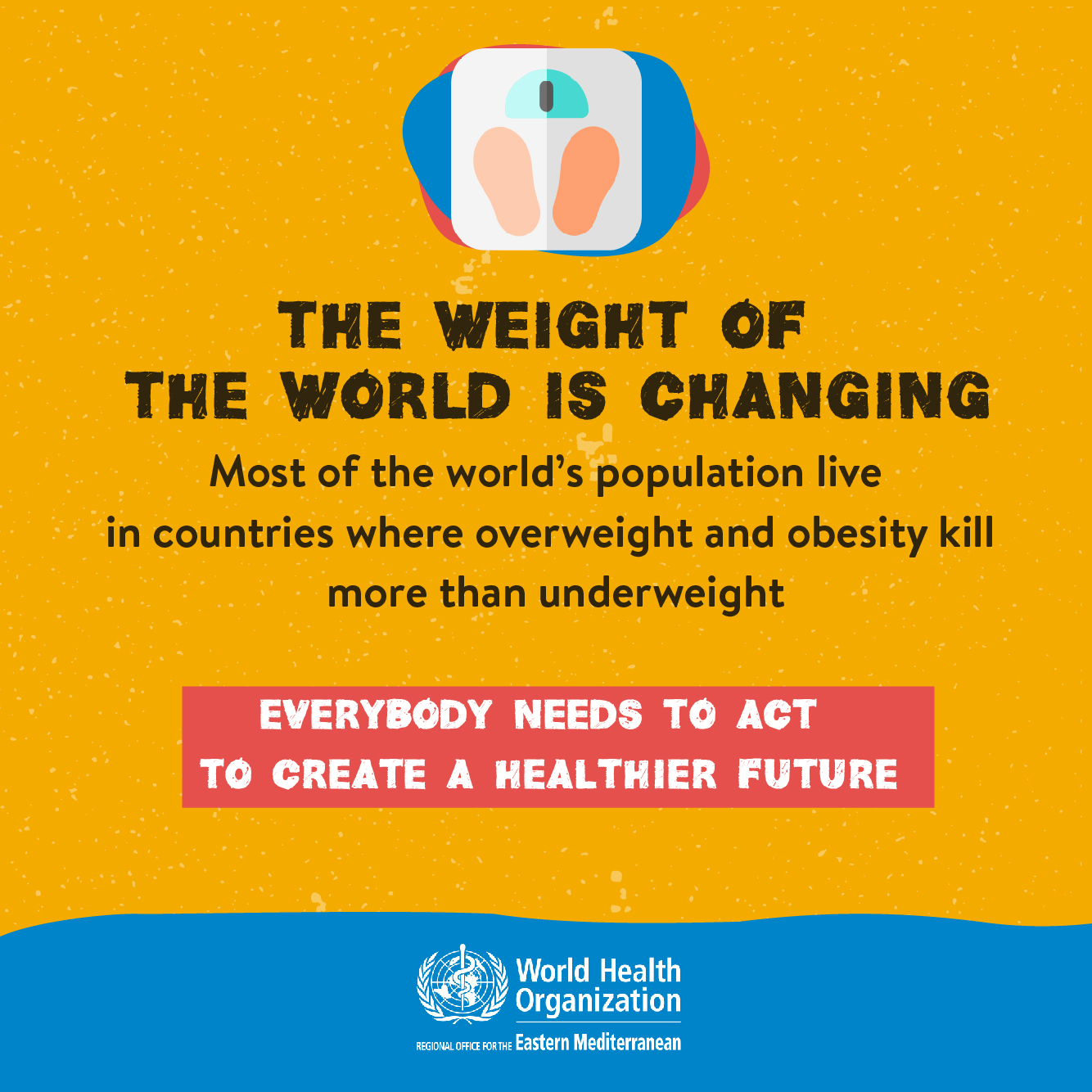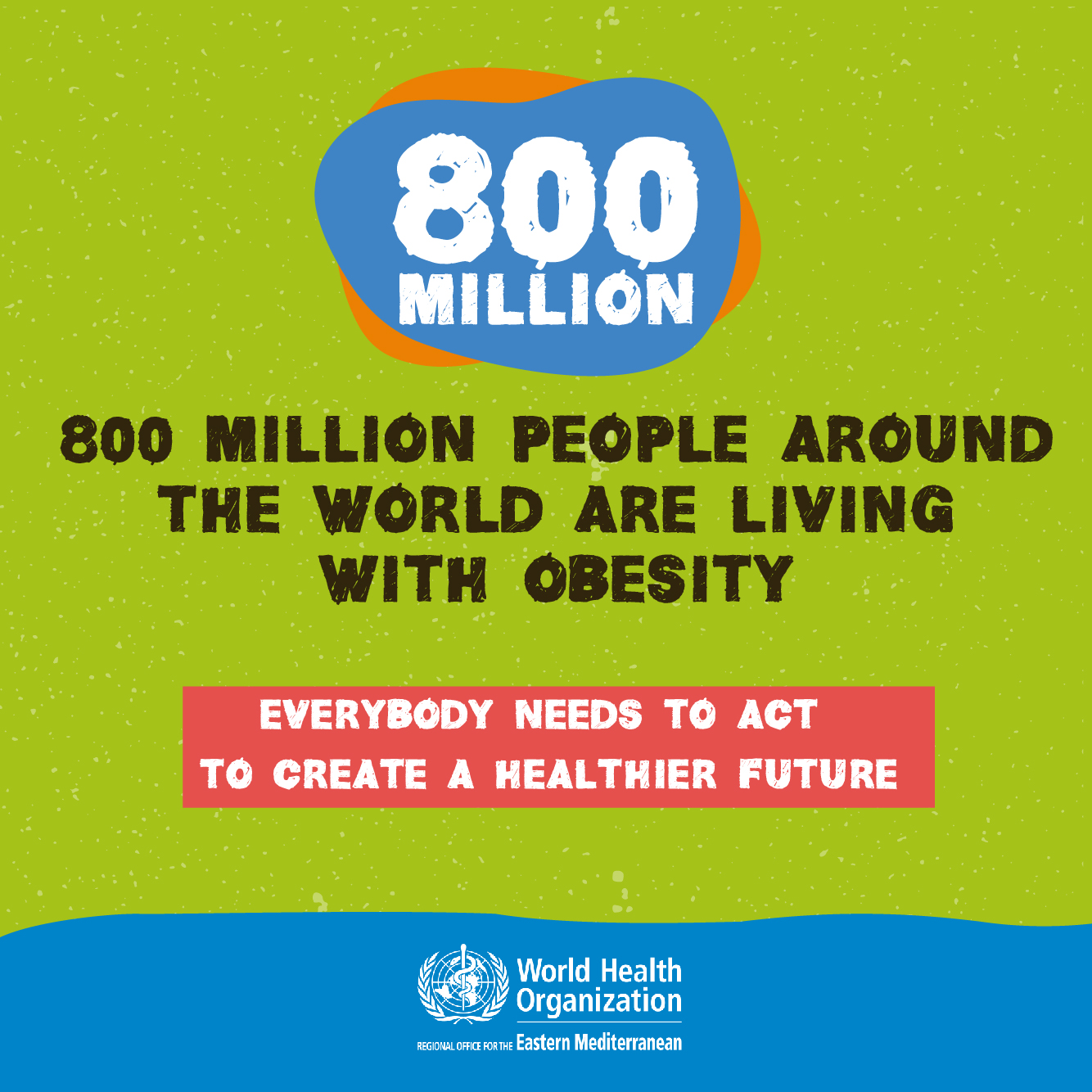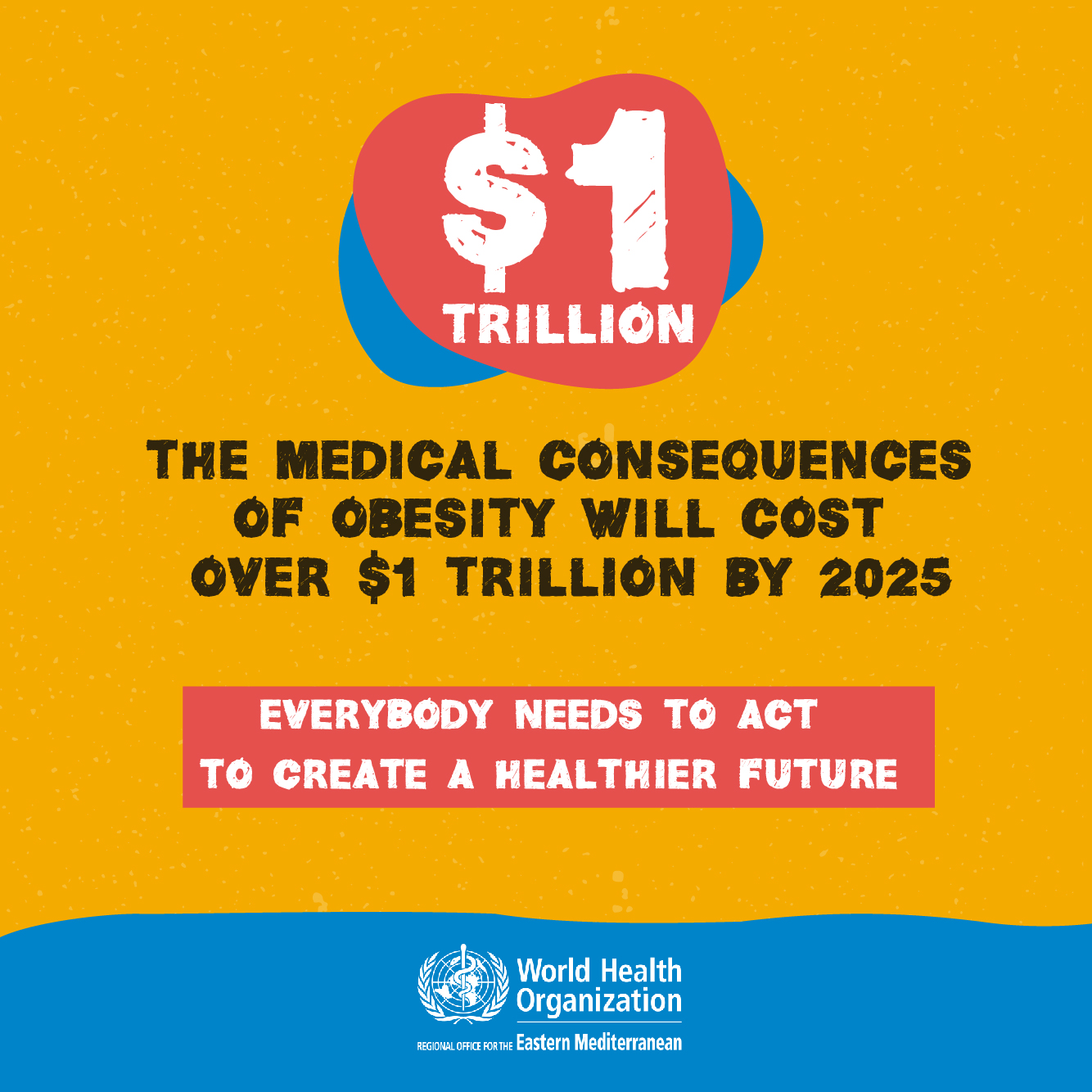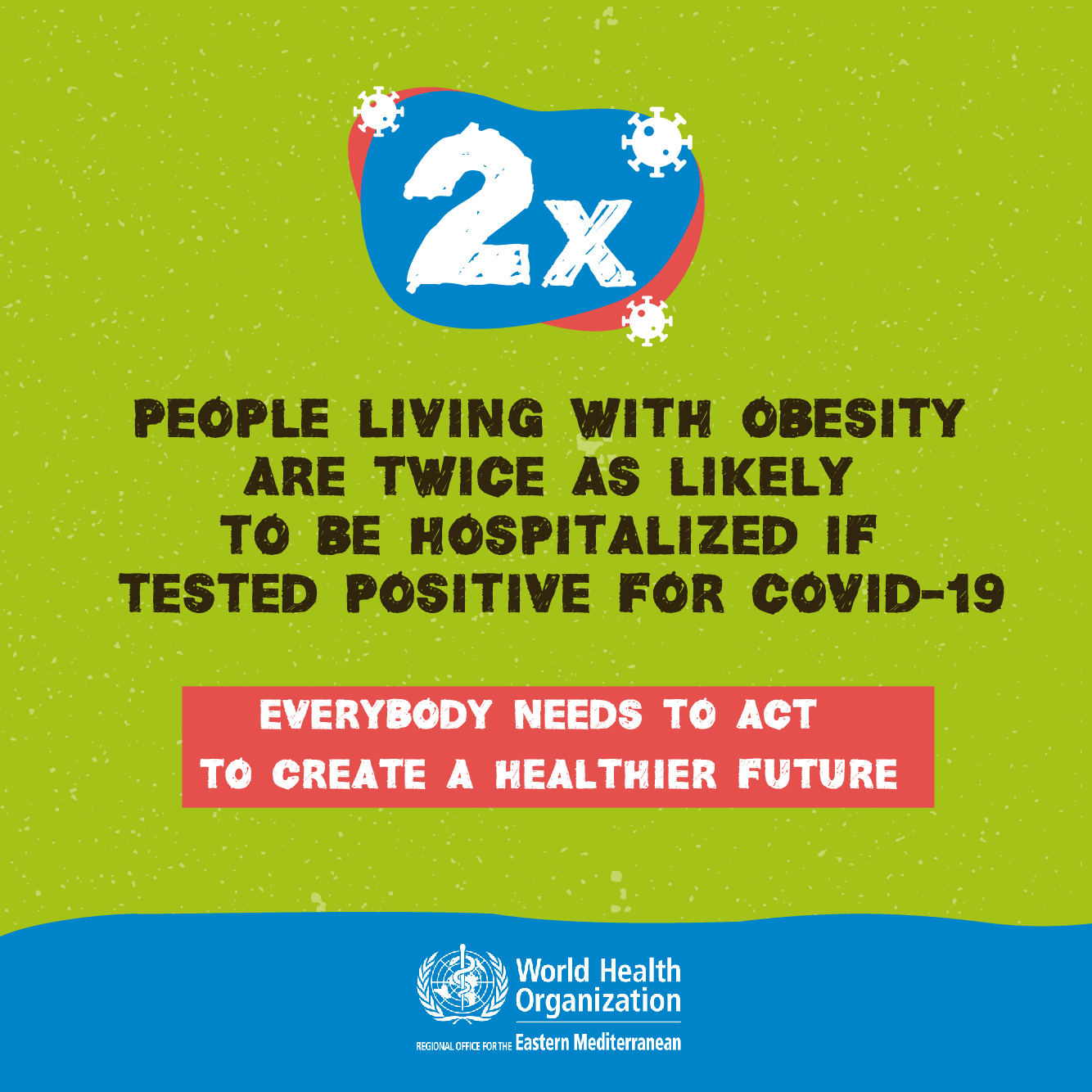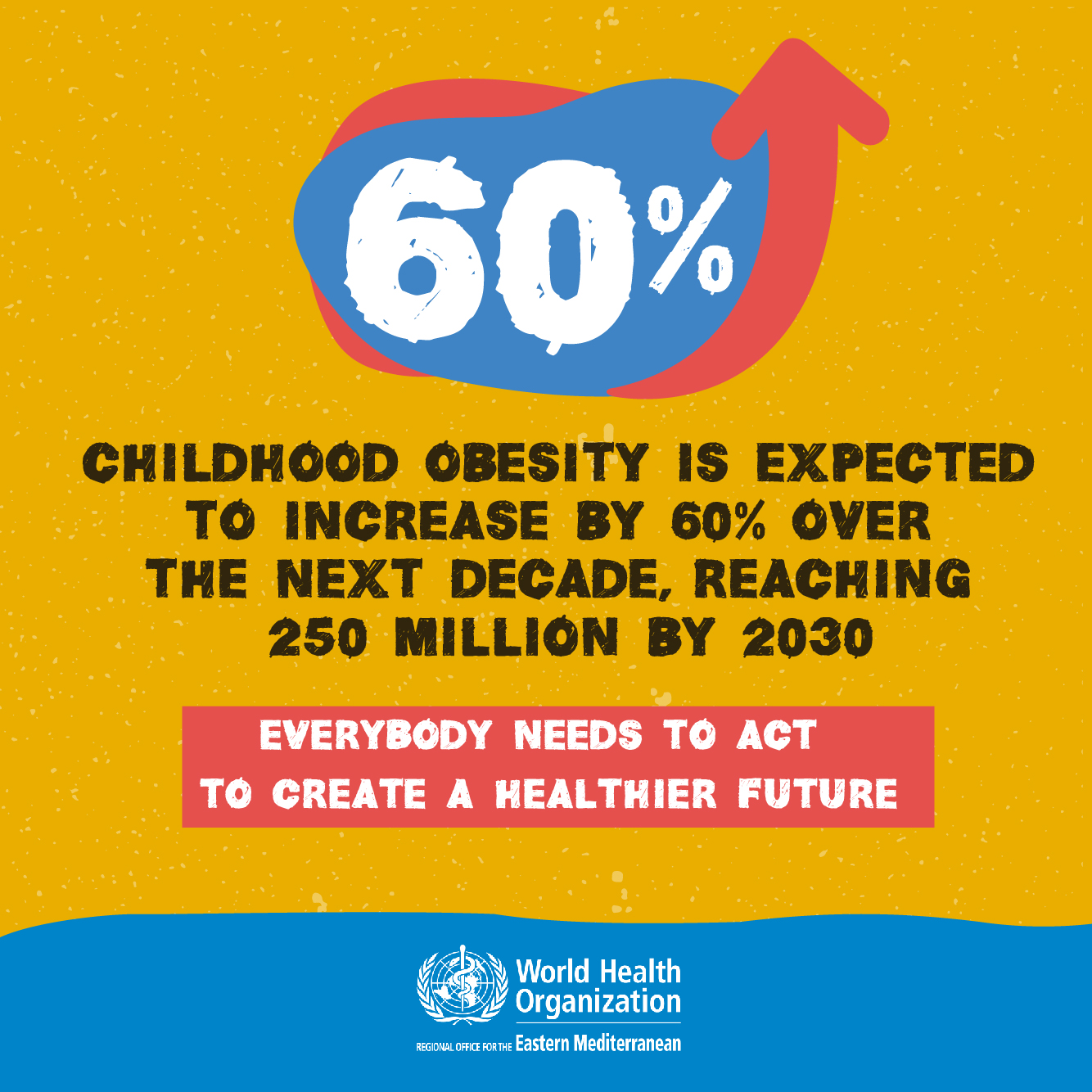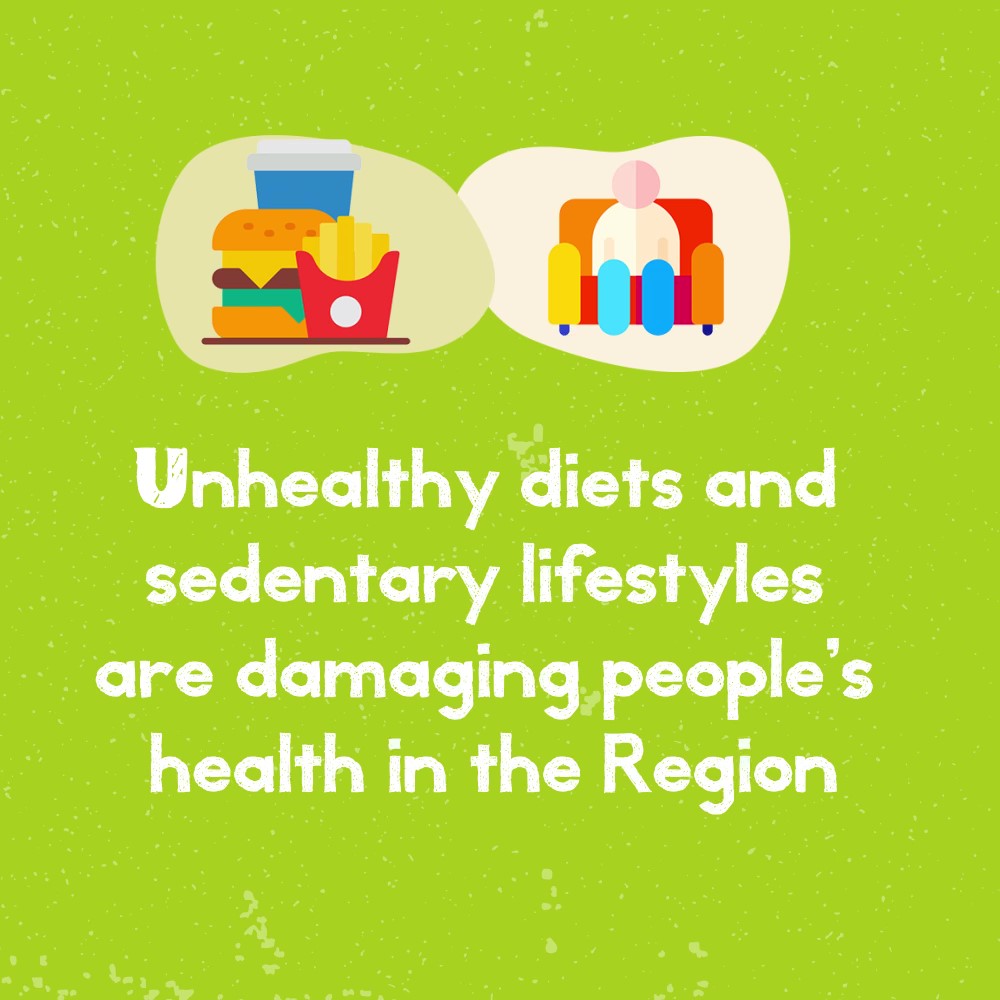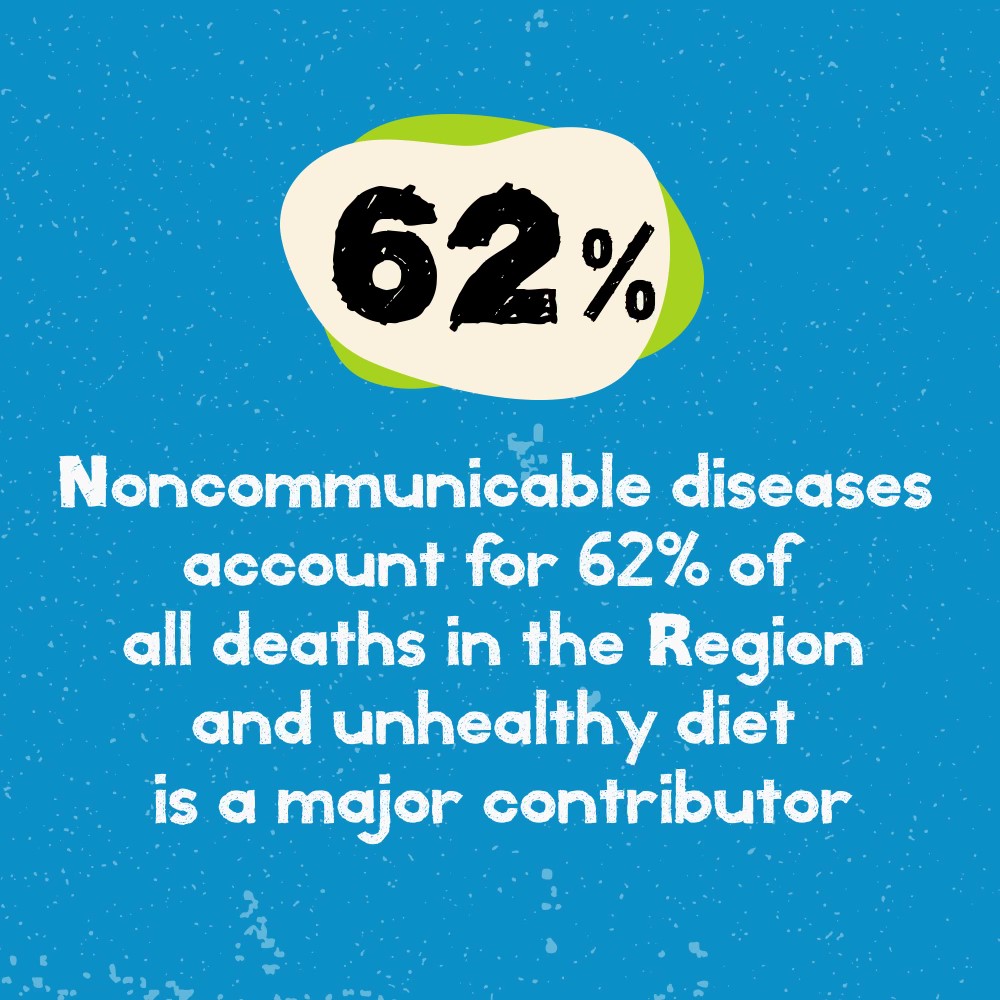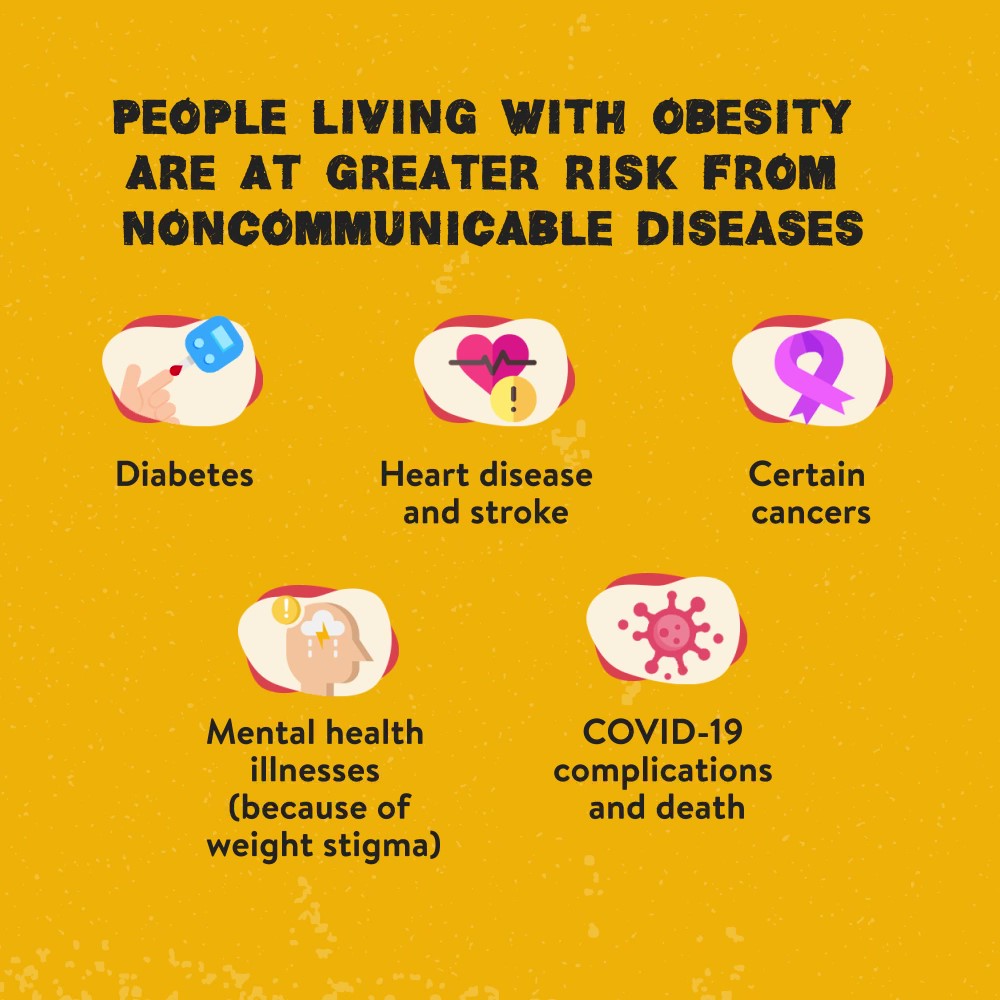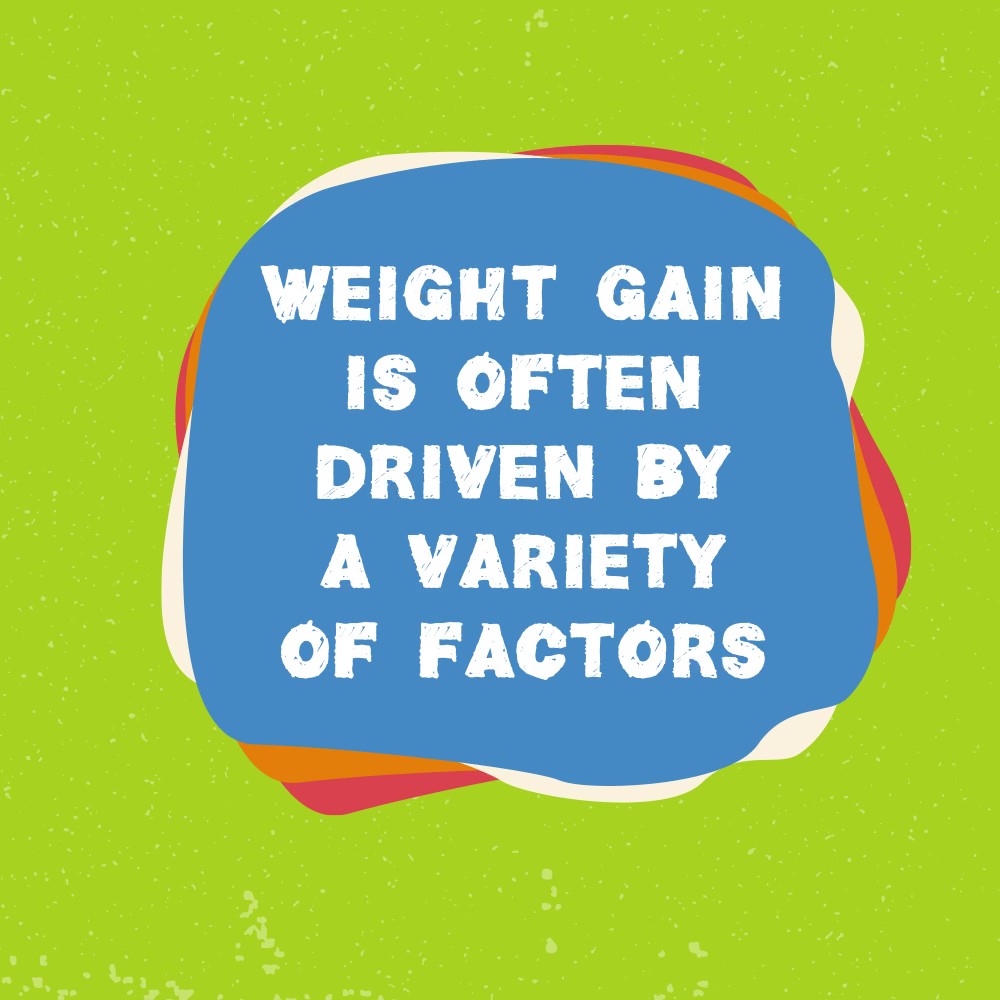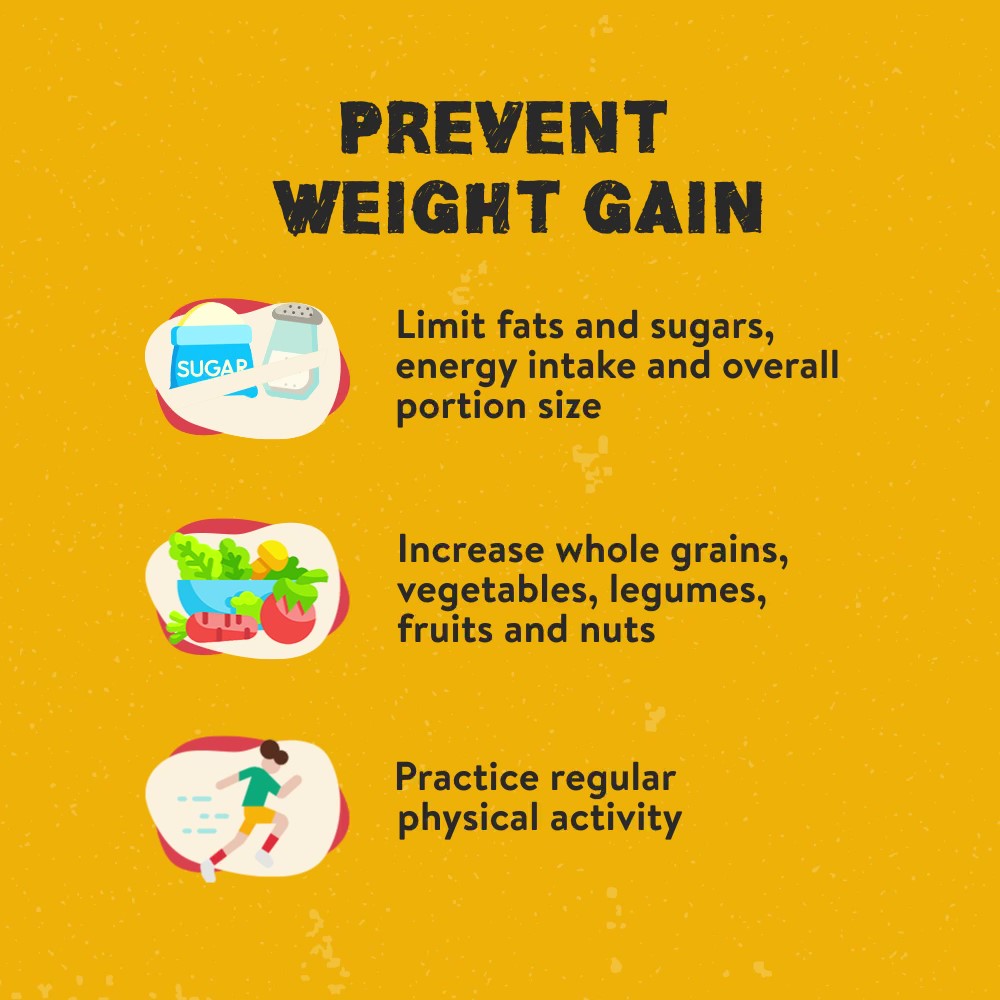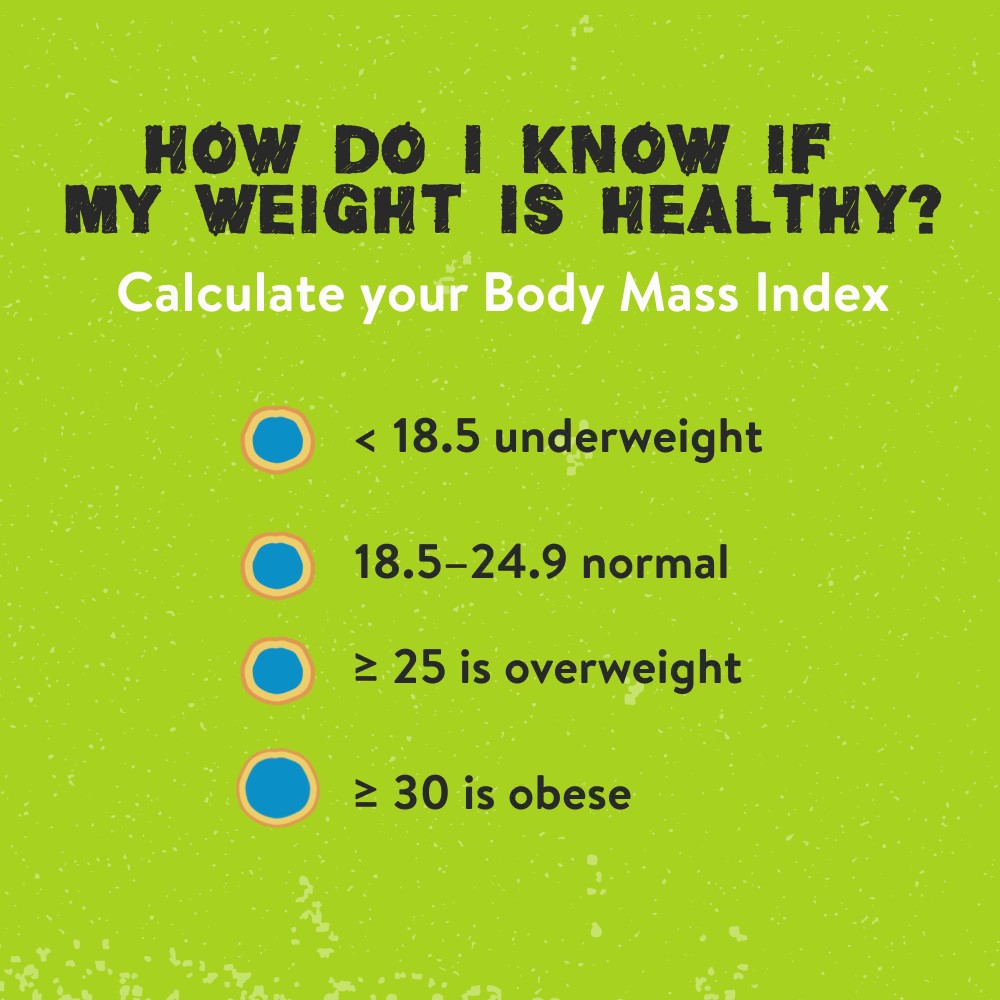Everybody needs to act

Globally, 800 million people are living with obesity. In WHO’s Eastern Mediterranean Region, most countries have experienced a nutrition transition towards unhealthy diets and sedentary lifestyles. Almost half the Region’s adults (49%), over a quarter (26%) of adolescents and nearly 6% of children under 5 are affected by overweight or obesity.
Noncommunicable diseases are responsible for 62% of all deaths in the Region and unhealthy diet is a major contributor. Most countries in the Region are faced with the double burden of malnutrition, whereby undernutrition and overweight/obesity co-exist within the population. Across the Region, unhealthy dietary practices are prevalent in children, adolescents and adults.
People living with obesity are twice as likely to be hospitalized if tested positive for COVID-19. In children, obesity has nearly doubled every 10 years. By 2030, it will rise to 60%, affecting 250 million children. The medical consequences of obesity are high and will cost over US $ 1 trillion by 2025. To treat this disease effectively and halt its rise, we need effective health care and wider cross-sectoral support.
On World Obesity Day, 4 March, WHO and partners are calling on everybody to work together because this is the only way we can improve understanding, prevention and treatment of obesity, and make progress. We need to act at all levels to combat the obesity epidemic and address its many root causes to create a healthier future.
By raising awareness and improving access to appropriate information, we can combat this disease now and post-COVID-19, especially in low- and middle-income countries, in which obesity is rising fastest. Obesity can be prevented and treated through the adoption of healthy lifestyles. Raising people’s awareness of the links between lifestyle and obesity, and COVID-19 complications and obesity, can not only reduce the burden but empower people to make healthy lifestyle choices, such as keeping physically active and choosing healthy food and drinks.
Risks of obesity
People living with obesity are at greater risk from noncommunicable diseases, such as diabetes, cardiovascular disease and certain cancers, as well as mental health illnesses (because of weight stigma), and COVID-19 complications and death.
Preventing and treating obesity is not just about losing weight, it is about adopting healthier behaviours to manage this disease and improve overall health. Equally as important is supporting appropriate nutrition for children to prevent and treat childhood obesity otherwise, it carries through into adulthood. Obesity in children affects their physical health, social and emotional well-being, and self-esteem. It is also linked to poor academic performance and a lower quality of life.
Root causes of obesity
Obesity is not anyone’s fault. Weight gain is often driven by a variety of factors that are outside people’s control such as biology, mental health, genetic risk, life events, environment, access to health care, marketing and access to ultra-processed food. Obesity is not caused by a lack of willpower.
Obesity and COVID-19
Obesity is now a major factor in COVID-19 complications and deaths. At the 2020 Global Obesity Forum, the global obesity community came together to acknowledge the complexity of this disease and developed the ROOTS approach, which sets out an integrated, equitable, comprehensive and person-centred approach to addressing obesity. Building on the ROOTS approach, the global obesity community issued a declaration that sets out recommendations for immediate action across the obesity spectrum from prevention to treatment, within the context of COVID-19.
Recognizing that obesity is a disease in its own right, as well as a risk factor for other conditions, including significantly worsening the outcomes of COVID-19 infection.
Obesity monitoring and surveillance must be enhanced to strengthen effective strategies for preventing and treating obesity.
Obesity prevention strategies must be developed, tested and implemented across the life course, from pre-conception, through childhood, and into older age.
Treatment of obesity – including behavioural, pharmacological, digital, nutritional, physical activity based and surgical interventions – should be accessible to all people with obesity.
Systems-based approaches should be applied to the treatment and prevention of obesity.
Obesity prevention and control
It is possible to prevent and control obesity but we need action on all fronts. We need to raise awareness and improve access to the appropriate information to ensure happier, longer and healthier lives for everyone now and in our post-COVID-19 future. There is a need for health systems to address obesity prevention and treatment through strengthening health systems and moving towards universal health coverage. There is also much work to be done on prevention in terms of both public education and policy action.
The regional framework for action on obesity prevention 20192023, a road map for countries of the Region to implement the action areas of the United Nations Decade of Action on Nutrition, is central to accelerating action on obesity prevention and control.
Regional framework for action on obesity prevention 2019–2023
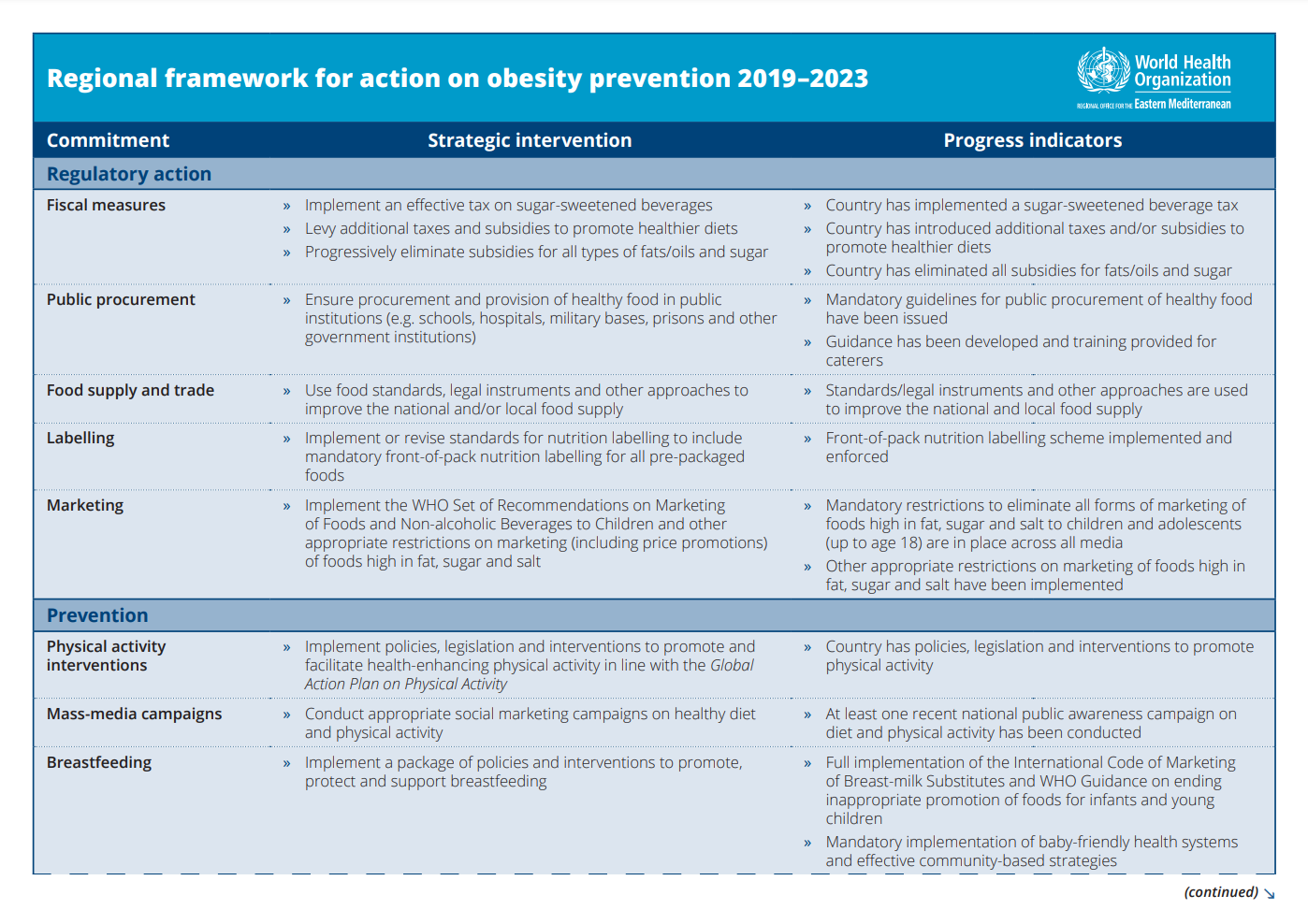
In October 2019, the WHO Regional Committee for the Eastern Mediterranean endorsed a regional framework to support countries scale up action on obesity prevention in the Region. This document translates a series of policy priorities into regional commitments. The regional framework provides strategic interventions and indicators for countries to assess their progress in the four domains of:
Regulatory action (fiscal measures, public procurement, food supply and trade, labelling and marketing)
Prevention (physical activity interventions, mass media campaigns, breastfeeding and reformulation)
Obesity management and treatment (health sector interventions)
Surveillance (assessment and monitoring)
The regional framework is a road map for countries of the Region to implement the action areas of the United Nations Decade of Action on Nutrition. It is central to accelerating action on obesity prevention and control, and sets out 6 key action areas for improving nutrition and food security, including: sustainable, resilient food systems for healthy diets; aligned health systems providing universal coverage of essential nutrition actions; social protection and nutrition education; trade and investment for improved nutrition; safe and supportive environments for nutrition at all ages; and strengthened governance and accountability for nutrition. We urge countries to step up implementation of the regional framework for action on obesity prevention to improve understanding, prevention and treatment of obesity to create a healthier future.
Regional framework for action on obesity prevention 2019–2023
United Nations Decade of Action on Nutrition
Overweight/obesity data and statistics

WHO works together with partners, the Food and Agriculture Organization of the United Nations (FAO) and the United Nations Children’s Fund (UNICEF), to systematically monitor all forms of malnutrition, including overweight, obesity and diet-related noncommunicable diseases (heart disease, stroke, diabetes and some cancers).
We collect, analyse, publish and disseminate these data to support countries to set nutrition targets, track progress, and define policies and strategies for improving nutrition to support health and well-being for all, at all ages, and to meet Sustainable Development Goal 2 (end hunger, achieve food security and improved nutrition and promote sustainable agriculture) and Goal 3 (ensure healthy lives and promote well-being for all at all ages), together with other regional and global commitments within the United Nations Decade of Action on Nutrition and WHO’s “Ambition and action in nutrition 2016–2025”, which aims for “a world free from all forms of malnutrition where all people achieve health and well-being”.
Access our data and statistics
Social cards
Animated GIFs
Success stories
Bahrain
Tackling obesity: identification, evaluation and treatment of obesity and overweight among adults and adolescents
In 2008, the first nutrition clinic was established within the existing primary healthcare facilities of the Ministry of Health, as a response to the notable rise in obesity and overweight in Bahrain that was recorded in 2007, and by the year 2018, the Ministry of Health had established a total of five nutrition centers covering all regions. The nutrition centers are managed by the Nutrition Section, part of the Public Health Directorate of the Ministry of Health..
Jordan
Multisectoral coordination to tackle obesity in Jordan
In March 2019, a multisectoral technical committee on nutrition was established in Jordan, under the National Framework of Action on Obesity Prevention in Jordan 2018-2023. Under the umbrella of the Ministry of Health, the Committee also involved the Jordan Food and Drug Administration, Jordan Standards and Metrology Organization, Ministry of Education, Amman Municipality, Ministry of Youth, Ministry of Industry and Trade, the Royal Medical Services, Ministry of Planning and the University of Jordan. The committee’s objectives relate to reformulation to eliminate trans fats and reduce saturated fats, sugars and salt, along with promotion of physical activity, mandatory nutrition labelling and restrictions on marketing of foods high in fats, sugars and/or salt as well as breast-milk substitutes. Early achievements include modification of all the standards for dairy products (obliging manufacturers to eliminate addition of industrial trans fats and non-dairy fats in dairy products), reducing salt levels in Arabic bread from 1.5% to 1%, publication of food composition tables for traditional Jordanian foods, publication of dietary guidelines for management of noncommunicable diseases, publication of national food-based dietary guidelines, prohibiting use of trans fats, margarine and saturated fats in foods provided in hospitals and some other public institutions and provision of healthy meals through youth camps. Items on the agenda include improving the standards of nutrition labelling and obliging manufacturers to eliminate addition of plant oils in iced milky products.
Pakistan
Nationally representative survey in Pakistan
In 2018 the government of Pakistan and UNICEF carried out a national nutrition survey (NNS 2018). The survey, which included children, women of reproductive age and adolescent boys and girls, was the fifth national nutrition survey since 1965 and the first to provide district-representative data and to include adolescents. The cross-sectional, household-level survey combined quantitative and qualitative approaches. A national, province and district representative sample of 76 742 children under 5, 145 847 adolescents (10-19 years) and 145 324 women of reproductive age (15-45 years) was selected from 115 600 households.
The survey assessed nutritional status — stunting, wasting, underweight, overweight and micronutrient status (anaemia, iron, zinc, vitamins A and D, iodine). It also evaluated infant and young child feeding practices, implementation of universal salt iodization, household food insecurity, social protection and water, sanitation and hygiene (WASH). The survey highlighted that the double burden of malnutrition is becoming increasingly apparent, with almost one in three children under 5 underweight while the prevalence of overweight in the same age group was 9.5% and had almost doubled 5% between 2011 and 2018. The survey was also able to highlight differences between urban and rural areas, by gender and by province/region.
Published articles on overweight and obesity in the Region
This page is dedicated to published articles on various topics around overweight and obesity in the Region. It consists of 13 articles and is being regularly updated. Some articles are dedicated to countries of the Eastern Mediterranean Region as a whole while others cover specific countries such as Bahrain, Egypt, Iran, Iraq, Kuwait, Lebanon, Oman, Qatar, Saudi Arabia and United Arab Emirates. Topics covered include:
achieving global targets in nutrition.
food marketing to children.
impact of bariatric surgery on the healthy eating index, binge eating behaviour and food craving.
hypertension in adolescents in relation to obesity.
disparities in prevalence of obesity among school-aged children.
emerging pandemic of obesity in preschool children.
trend and causes of overweight and obesity among preschool children.
food consumption patterns among children and adolescents and their correlation with overweight/obesity.
overweight and increased risk of right ventricular dysfunction in non-breastfed infants.
impact evaluation of national nutrition policies to address obesity through implementation of sin taxes.
tackling obesity.
regional policies on sugar intake reduction at population levels to address obesity.
nutritional anaemia and obesity.





